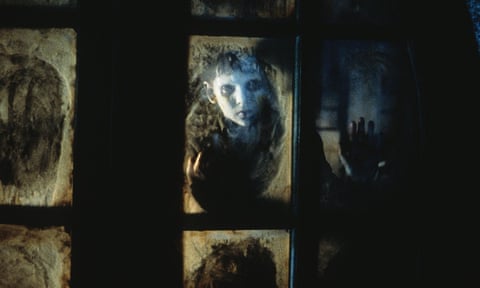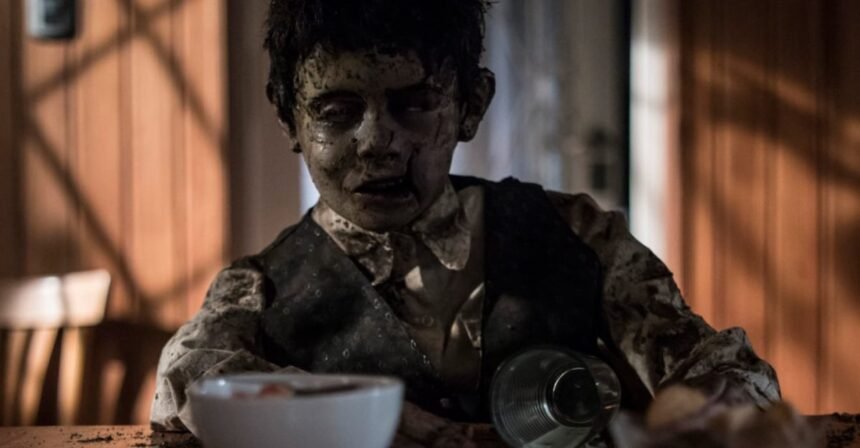Introduction
The Boy Who Played With Ghosts Most Horrible Story Every little town has enduring tales that have been passed down through the generations. Some are so ingrained in the town’s past that they contribute to its identity.
One such tale has been told for centuries in the town of Mill Hollow, which is tucked away amid dark woodlands and meandering rivers.It tells the terrifying story of a youngster who saw and communicated with ghosts for reasons no one really understood.
They claim that he made friends with ghosts from the afterlife and even played and joked with them. However, the more he played, the riskier it got—until the youngster vanished one day, leaving only the sound of his laughing.
The Boy of Mill Hollow
The boy in question was named Eliot Turner, a curious and adventurous child who lived on the outskirts of Mill Hollow with his mother, Clara, and his younger sister, Grace. The Turner family had always been a little different from the other families in town. They lived in an old house on the edge of the forest, where the trees were so thick that they seemed to swallow the light, and the wind always carried an unsettling whisper.
Eliot was a quiet, introspective boy, but with a fascination for the supernatural that was impossible to ignore. From an early age, he showed an uncanny ability to sense things that others couldn’t. He would often speak about people who weren’t there, or tell stories about his “friends” who lived in the attic or played in the backyard when no one else was around.
At first, his mother dismissed these stories as the product of an overactive imagination. But soon, it became clear that Eliot’s encounters weren’t mere fantasies.
One day, when Eliot was eight years old, he came rushing into the house, his face pale and his eyes wide with excitement.
“Mom! Mom!” he cried. “I met a man in the garden! He’s tall and has a big hat, and he told me stories about the old town.”
Clara smiled, brushing a strand of hair from her face. “That’s nice, Eliot. But you know you’re not supposed to talk to strangers.”
“No, Mom,” Eliot insisted, his voice trembling. “He’s not a stranger. I’ve met him before. He told me he was here long before the house was built.”
Clara paused, her smile fading. She knew her son was different, but the thought of a stranger wandering around the house unsettled her. Still, she chalked it up to the boy’s vivid imagination. However, as the days passed, more and more strange incidents began to occur.

The Encounters with Ghosts
It started with small things: objects moving on their own, the sudden flickering of lights, and the feeling of being watched. Grace, Eliot’s younger sister, began to complain of strange noises coming from the attic. At night, she would often wake up, saying that she could hear footsteps pacing back and forth above her bedroom.
Clara, of course, dismissed these as the sounds of an old house settling. But Eliot wasn’t so sure. He seemed to grow increasingly attuned to the strange happenings around him. One evening, Clara found him sitting on the front porch, his eyes fixed on the dark forest beyond the house.
“Who are you talking to, Eliot?” she asked, noticing that he was whispering to someone.
Eliot looked up, his face serious. “It’s Sarah. She’s the little girl who lives in the attic. She’s lonely, but she doesn’t like it when I tell you about her.”
Clara felt a chill run down her spine. “Eliot, what do you mean? There’s no little girl in the attic.”
Eliot’s eyes brightened as if he knew a secret. “She’s the one who knocks on the walls when I’m in my room. She says she can’t leave because her parents don’t know she’s gone.”
Clara shook her head, trying to rationalize his words. “Eliot, you’re just imagining things.”
But Eliot wasn’t imagining things. Over time, more and more spirits began to make themselves known to him. It wasn’t just Sarah—the little girl in the attic. There was Thomas, a man in a long black coat who walked the garden at dusk; Abigail, the old woman who sat in the rocking chair by the fireplace, humming old lullabies; and even Mr. Roberts, a kindly old man who had lived in the house before the Turners moved in.
It seemed that Eliot was surrounded by ghosts, each one with a story to tell. He would often sit with them, listening intently as they spoke of their lives, their deaths, and the lives they left behind. They were his friends, and he treated them as such—talking to them as though they were as real as any living person.
Eliot’s mother, Clara, grew more and more concerned. She had no explanation for what was happening, but she knew it was something beyond ordinary. And as the weeks went by, she began to notice a change in her son. He no longer seemed like the happy, carefree boy he once was. His face grew pale, and his eyes were always distant, as if he were somewhere else—somewhere far away.
Read More
The Growing Darkness
As Eliot’s interactions with the spirits deepened, so did the nature of his encounters. The ghosts that once seemed benign began to change. They no longer told simple stories; they began to ask Eliot for favors, to carry out strange tasks, and to perform rituals that made Clara uncomfortable.
One night, Clara overheard Eliot talking to someone in his room. At first, she thought it was just another conversation with his “friends,” but when she listened closer, she heard something that sent a shiver down her spine.
“I’ll do it,” Eliot whispered in a hushed voice. “I’ll help you cross over, but you have to promise you won’t hurt my family.”
Clara pushed open the door, her heart racing. “Eliot, what are you talking about?”
Eliot looked up at her, his eyes wide and unfocused. “I’m helping them, Mom. They’re so lonely, and they need me to help them move on.”
Clara stepped forward, her concern growing. “Who are you talking about, Eliot?”
Before he could respond, a cold wind swept through the room, and the door slammed shut behind her. Clara stumbled back, fear gripping her heart. She didn’t know what was happening to her son, but she knew she needed help.
The Final Night
As the days turned into weeks, the atmosphere in the house grew more oppressive. Eliot seemed to be slipping away, becoming more and more distant. The spirits, once friendly, began to grow restless, and the once peaceful house began to feel like a prison.
Clara decided to take action. She contacted a local priest, Father O’Malley, known for his work with troubled souls. The priest arrived at the house and immediately began to sense the presence of many spirits lingering in the air.
“That boy,” he said gravely. “He’s become a vessel for them. They’re using him to get to the living.”
Father O’Malley performed a series of rituals, but nothing seemed to work. The spirits grew angry, and the air in the house thickened with tension.
Then, one night, Eliot disappeared.
Clara searched frantically, calling his name, but he was nowhere to be found. The house was silent, the spirits seemingly gone. In the weeks that followed, the police were called, and a search was conducted, but there was no trace of Eliot. It was as if he had simply vanished into thin air.
The Legacy of the Boy Who Played with Ghosts
Years passed, but the mystery of Eliot Turner remained unsolved. Some said he had crossed over to the other side, taken by the spirits he had befriended. Others believed that he had simply disappeared, unable to bear the weight of the darkness that had consumed him.
To this day, the house on the outskirts of Mill Hollow stands empty. The trees are thick, the wind whispers through the branches, and the air is heavy with the memory of the boy who once played with ghosts. And though the house is abandoned, there are those who claim to have seen a shadowy figure in the window, a young boy with wide, distant eyes, still watching, still waiting for the next person who dares to listen to the whispers of the dead.

Conclusion
The story of Eliot Turner serves as a haunting reminder of the thin veil that separates the living from the dead. A tale of a young boy’s innocence twisted into something darker, the story of Eliot is a chilling exploration of how curiosity can lead us down paths that even the bravest may not return from. His connection to the spirits was not one of peace, but of manipulation—he was a conduit for forces beyond comprehension.
In Mill Hollow, the wind still whispers through the trees, and those brave enough to venture near the abandoned house may feel an unsettling presence. Whether it is Eliot’s restless spirit or the ghosts he once played with, one thing is certain: some boundaries should never be crossed. Some friendships, no matter how friendly they seem, are better left unmade.
